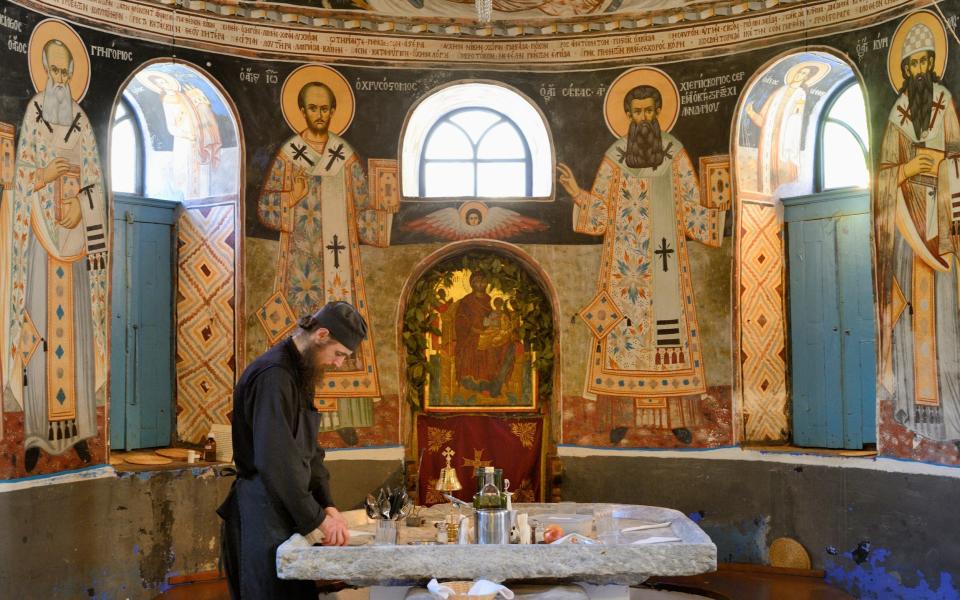I know why King Charles is so drawn to the extraordinary spiritual retreat of Mount Athos

Why has His Majesty King Charles III, the Supreme Governor of the Church of England, sought spiritual support in his fight against cancer from Archimandrite Ephraim, an Elder of the Greek Orthodox Church? The answer lies on Mount Athos, where Elder Ephraim is a monk.
The King has visited Elder Ephraim’s monastery, Vatopedi, many times. Having visited Mount Athos myself, I can confirm that it is a uniquely spiritual place, for Christians of any denomination – and even for people of other faiths or no faith at all.
Although King Charles is the head of the Anglican Church, he has close connections with Orthodoxy.
His father, Prince Philip, was raised in the Greek Orthodox Church before converting to Anglicanism prior to his marriage to Princess Elizabeth. A Greek choir sang in Greek at his Coronation.

He reportedly has a collection of Byzantine icons in his home at Highgrove, many of them from Mount Athos, the holiest site in the Orthodox Church.
So what makes Mount Athos so special? Will it bring comfort and inspiration to anyone who travels there, be they profoundly spiritual (like Charles) or a lukewarm Anglican (like me)?
The first thing you need to know about Mount Athos is that half the population of the world can never, ever go there. You’re only allowed onto this rocky peninsula (technically part of Greece but in practice almost entirely autonomous) if you’re a man.
It’s been out of bounds to women since the earliest days of Christianity, when the Virgin Mary reputedly came ashore, was amazed by its beauty and asked her son to make it her personal garden. Jesus complied and since then all other women have been banned.
If you’re a man you can apply for a four-day visit. Contact the Mount Athos Office in Thessaloniki by phone or mail. Allow several weeks at least. Entry is limited to 100 Greek Orthodox and 10 non-Orthodox visitors a day.
Then you’ll need to apply to one of the monasteries for accommodation. There’s nowhere else to stay. The monasteries don’t charge for accommodation, though you’re welcome to make a donation. But be warned: this is a pilgrimage, not a holiday.

Getting there is an adventure. Mount Athos is a craggy peak 2000m high, overlooking a peninsula 50km long and about 10km wide. Although it’s a promontory, not an island, there’s no land access from the mainland. The only way in or out is by ferry.
For anyone accustomed to the creature comforts of the western world, arriving here is a shock. “It felt like travelling back in time” may be a tired old travel-writer’s cliché, but this is the only place I’ve ever been where it really felt as if I’d been transported back to the Middle Ages.

There are 20 monasteries on Mount Athos, but virtually nothing else. They look like medieval castles, inside and out, and most of them are pretty isolated, surrounded by woodland and dense undergrowth, with no other trace of civilisation, not even a streetlight, in sight.
The monasteries have kitchen gardens but these only amount to a few small fields. Beyond their robust walls the land is uncultivated: wild and overgrown. There are rough tracks between the monasteries, but without any signposts you’d struggle to find your way.
The monasteries aren’t entirely imprisoned in the past. There is electricity and most have a vehicle or two, but any modern accessories are kept to a bare minimum. Is staying here enlightening or frightening? For me, it was a bit of both.

Daily life is spartan. The food is basic and the dormitory accommodation is austere. The fortified gates are shut at dusk and only opened again at dawn. You’re welcome to sit in on the religious services (which are numerous, arduous and intensely atmospheric) but if you’re not Orthodox you can only observe rather than participate.
Why is Mount Athos such an important place for Charles? If you’ve led a life of luxury, austerity can be liberating. If you’ve always been the centre of attention, never allowed any anonymity, being in a place where wealth and status mean nothing can be a balm.
When I left Mount Athos I felt elated. It wasn’t the austerity I minded but the sense of isolation, like being a castaway on a desert island. The worst thing of all was the complete absence of women.

Being in an all-male environment felt wrong, like being locked up in prison. My first meal back on the mainland was bliss. Not just the food and drink, which felt like a feast after four days on Mount Athos, but above all being back among women. Every waitress and shop assistant seemed like a Beauty Queen.
Yet on reflection I realised this brief respite from the sensory overload of the modern world had changed me.
Stripping away the unnecessary accoutrements of modern life, if only for a few days, had brought me closer to… Well, to what exactly? God? Eternity? A deeper sense of self?
It’s an experience I’m in no hurry to repeat, but I wouldn’t have missed it for the world. And if I was the King of England, I think it might be the only place on earth where I’d feel entirely at ease.


